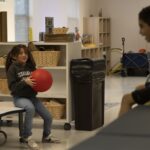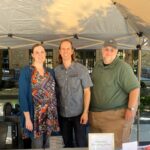
The campaign hosts group meetings for fathers from 6 p.m. to 8 p. m. every Wednesday at 3014 Rivas, Suite 20.
By Joe Camacho
In 1999, at the age of 29, Frank Castro sowed the seeds for what would become the San Antonio Fatherhood Campaign.
It was an important stepping stone for a youth who had grown up on the West Side of San Antonio without a biological father and who had already dedicated years to mentoring San Antonio youth.
After years of mentoring and researching services that would help men of all ages become better fathers, Castro was close to launching a career dedicated to helping San Antonio families stay together and grow stronger.
After years of building, by 2004 Castro had the support, partnerships and grants to spearhead the San Antonio Fatherhood Campaign, the city’s first non-profit organization to help Latino/Chicano and Native-American men of all ages men become better fathers.
It would be the first step in solving a problem he witnessed while mentoring young children.
“In 80 to 90 percent of the juvenile cases I dealt with, the kids came from single parent homes,” Castro, an A&M-San Antonio psychology senior, said.
That trend goes beyond the boundaries of San Antonio. More than 8 million households in the United States are single mother homes according to the 2010 Census Bureau report. These figures have increased by more than 10 percent since 2000.
With access to the real life stories behind the statistics, Castro had an idea to guide these children into a more meaningful path. Again and again, he said, he noticed young teens all having the same problems. To combat the cycle, he sought to find some commonality between the troubled youths that may have led them astray. Most of the troubled young men, he said, did not have a father living in their home.
“And that’s where the problem was in most of these cases,” said Castro, who began to research programs that might assist fathers get back into their children’s lives or programs to educate young men.
But when researching programs that might meet the needs of men, Castro said he noticed a gap in social work programs and organizations.
“Social programs at that time were not set up for men,” Castro said. “Programs like Planned Parenthood were good for women but they lacked the services necessary to educate young men.”
Further research led him to start the fatherhood campaign in partnership with other nonprofit organizations. With financial support from Making Connections-San Antonio and Annie Casey Foundation and numerous other organizations, Castro was given the green light and funding to begin a social work program where “fathers are encouraged to become actively involved in the health and wellness of their own lives as well as in the lives of their children,” according the campaign website.
San Antonio’s fatherhood campaign is funded through state grants, private donations and through partnering agencies.
Since 2004, the campaign has connected with more than 10,000 families in San Antonio and continues to support local fathers through family support meetings and through collaboration with partnering agencies.
The campaign established itself as a programmatic organization dedicated to getting to the heart of each case and individual problem solving.
Dad helps other dads
As a child growing up on the West Side of San Antonio, Castro said he and his peers shared something in common: many of them were growing up without a dad.
“If you look at the statistics, many of the households in this area are single-parent fatherless homes,” Castro said while seated San Antonio Fatherhood Campaign’s West Side office space. The office is located in the Family Service Association building located at 3014 Rivas, Suite 20. The building is also home for many other non-profit and community organizations.
“My father left when I was about twelve-years-old,” he said. “My dad was a pretty violent man.”
But there was help along the way. A step-father became a father figure come when he helped raise him and taught him values that he has now passed on to his children.
“My step-father was a great influence in my life,” Castro said.
There were lessons along the way:
At 15 years old Castro didn’t see yardwork as a really big deal. One day, he put minimal effort in getting the job done correctly. His lack of motivation and poor standard of work did not go unnoticed.
Castro relayed how his step-father responded.
“Is this you?” Castro said, quoting his stepfather. “Is this who you want people to think you are? Is this the quality of work you provide?’
Castro recalled his step-father’s disappointment, but also remembered the advice given to him on that day.
“Whatever you do don’t let anybody ever say this who you are,” his stepfather said. “Don’t ever let anybody say this is the kind of quality of work you provide in whatever you do.’”
Castro said that was of the greatest lessons his stepfather taught him.
Thirteen years later, Castro still lives by his stepfather’s words and at the age of 41, the nonprofit leader is in his seventh year serving as the program manager for The San Antonio Fatherhood Campaign.
And Castro is no stranger to fatherhood. With 4 children between the ages of 2 and 15, he has certainly done his share of daddy duty and will always continue to do so, he explained.
“My 5-year-old will be screaming at the grocery store, so I’ll scream back. People will look at us like we’re silly and I’ll say ‘hey, it’s like a game we play’,” he said. “I love my kids.”
Family support meetings offer fatherly and relational discussions
On a recent Wednesday evening, at a two-hour family support session held in a casual semi-circle classroom setting, Castro asked each attendee to describe himself as a man while not identifying himself as a father, husband, son, brother or uncle.
Each man sat reflectively before speaking. Several found it was difficult to describe when taking away those roles they play with their families.
The discussion included three women who accompanied their male counterparts. No one’s eyes roamed. And no one left. All participants stayed involved in the conversation.
“Once you can define yourself as a man,” Castro said to the class, “then that’s when all the other roles that you play begin to make life that much more fulfilling.”
“Everyone who has come to us is because they want to,” Castro said. “Sometimes all it is is a phone call from a dad who just needs to vent.”
Ages of participants ranged from 17 to 40 years old.
“Everyone attending these meetings has different things going on in their lives,” Castro explained. Some have custody of their children while others want to establish a stronger relationship with their children.
Francisco Brune, 28 and a father of two, has attended the group meetings for over a month. Brune has travelled from his home on the Northwest Side every Wednesday evening since April to attend the meetings.
“Frank really knows what he’s talking about and a lot of the stuff he’s covered has really helped me with some personal stuff,” Brune said.
He explained that he never knew of any programs like the fatherhood campaign and wished he had known about the program before he became a father.
“I would recommend that any new father or soon-to-be fathers attend these group sessions,” Brune said. “They not only help with the fathering aspect but give you the ability to define yourself as a man. I feel really comfortable with the staff. The meetings are really laid back.”
The campaign hosts group meetings for fathers from 6 p.m. to 8 p. m. every Wednesday at 3014 Rivas, Suite 20.
No one is ever ordered to seek help from the fatherhood campaign, Castro said. Recommendations are made to fathers through the court system, through churches, through friends and various other organizations.
“This is a non-punitive initiative,” Castro explained.
The atmosphere, created case by case and over a stretch of many years, is a product of Castro’s goals and ambitions. Each Wednesday, there is brotherly atmosphere where fathers can be more open about problems or issues they say they would never address in other programs that are run primarily by women.
Castro said escaping the suit and tie image has also helped to ease the apprehension of younger fathers who may not feel as comfortable otherwise.
Nonprofit Partnerships
In its earliest form, the San Antonio Fatherhood Campaign can be traced back to 2004 with a few members of the American Indians in Texas at the Spanish Colonial Missions (AIT-SCM).
The AIT-SCM is non-profit organization that began in 1994 to work for the preservation and protection of the culture and traditions of the Tap Pilam Coahuiltecan Nation and other indigenous people of the Spanish colonial missions in South Texas and northern Mexico.
Between 2001 and 2003, through their volunteer work as youth mentors, they noticed about half of the young males that they worked with were fathers.
“One male was as young as 12 years old,” AIT-SCM executive Director Ramon Vasquez said. “We all decided to rally around issues like manhood and fatherhood.”
The organization continues support as a parent to the fatherhood campaign.
The San Antonio Children’s Shelter has also worked in collaboration with Castro through programs like “Compadre y Compadre,” a 15-week “daddy boot camp” as described by Yvette Sanchez, vice president of family strengthening at the shelter.
“The primary goal of Compadre y Compadre is to prevent child abuse and neglect,” Sanchez said.
Fathers enrolled in the boot camp are taught the basics of caring for a child from simply changing a diaper to feeding a child.
“The biggest thing is that they commit to fathering without violence,” Sanchez explained.
Dads in the program commit to two hours per week for the 15-week program. Their completion is celebrated with a graduation and awards ceremony.
“The goal for this year is to have 280 dads complete the program,” Sanchez said.
Most of the men who take part in Compadre y Compadre have often come to the program through advisement from the SAFC.
“The SAFC has the best interests in dads and we can always count on them for support,” Sanchez said.
Other organizations such as the P.E.A.C.E. initiative have also stepped in, offering counseling on family violence prevention.
“By partnering with P.E.A.C.E it allowed us to put ourselves out there, Castro said. “We are one of the few fatherhood programs in the country that has its own family violence prevention program.
Putting the degree to work
“I originally started out as a pre-med student,” Castro said.
Although healthcare is important, he explained, he knew that even with good healthcare a patient can still suffer from the mind, such as in addiction.
“You can tell a person that smoking causes cancer but they will still do it anyway,” Castro said.
His driving decision to become a psychology major was his curiosity for what makes people do the things they do.
Often, Castro has worked with cases where a young man realized what it is that he could be doing better but still chose the same path.
“I realized it was more of a cognitive thing,” he explained.
Castro is currently studying psychology at A&M-San Antonio to make a connection between his own research and nonprofit experience with theories and practice taught in the classroom.
“I look at different learning strategies. How do we learn or relearn something so that we don’t keep making the same mistakes,” Castro said. “In order to create behavioral change, you have think about why a person is thinking that way.”
Castro has held off spring graduation so that he may walk the stage alongside his brother, business senior Adam Castro, 40, in December.
“That’s just a little gift we wanted to give to our mom.”
For more information about the San Antonio Fatherhood Campaign call 210-227-3463 or visit safatherhood.com.





